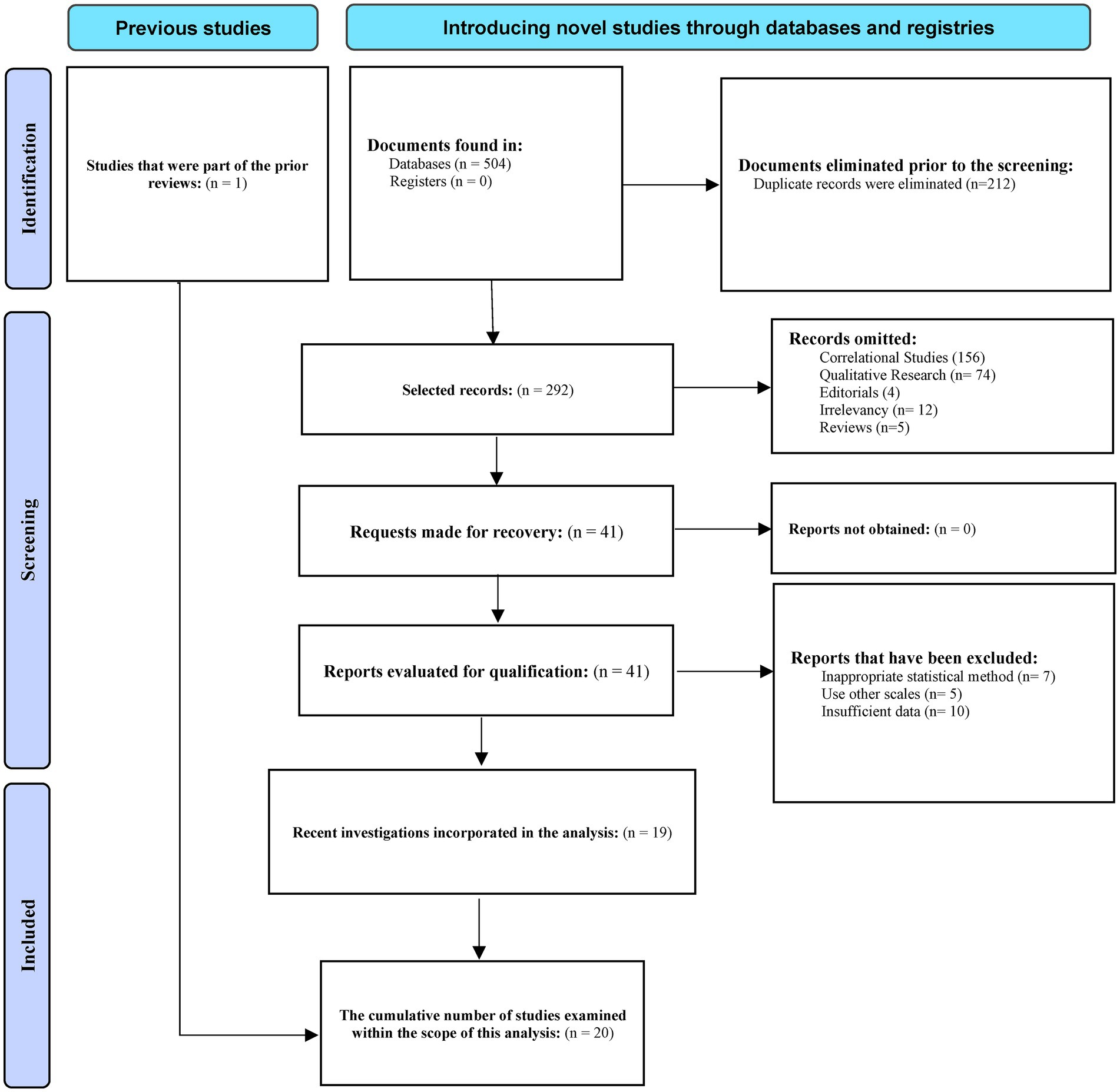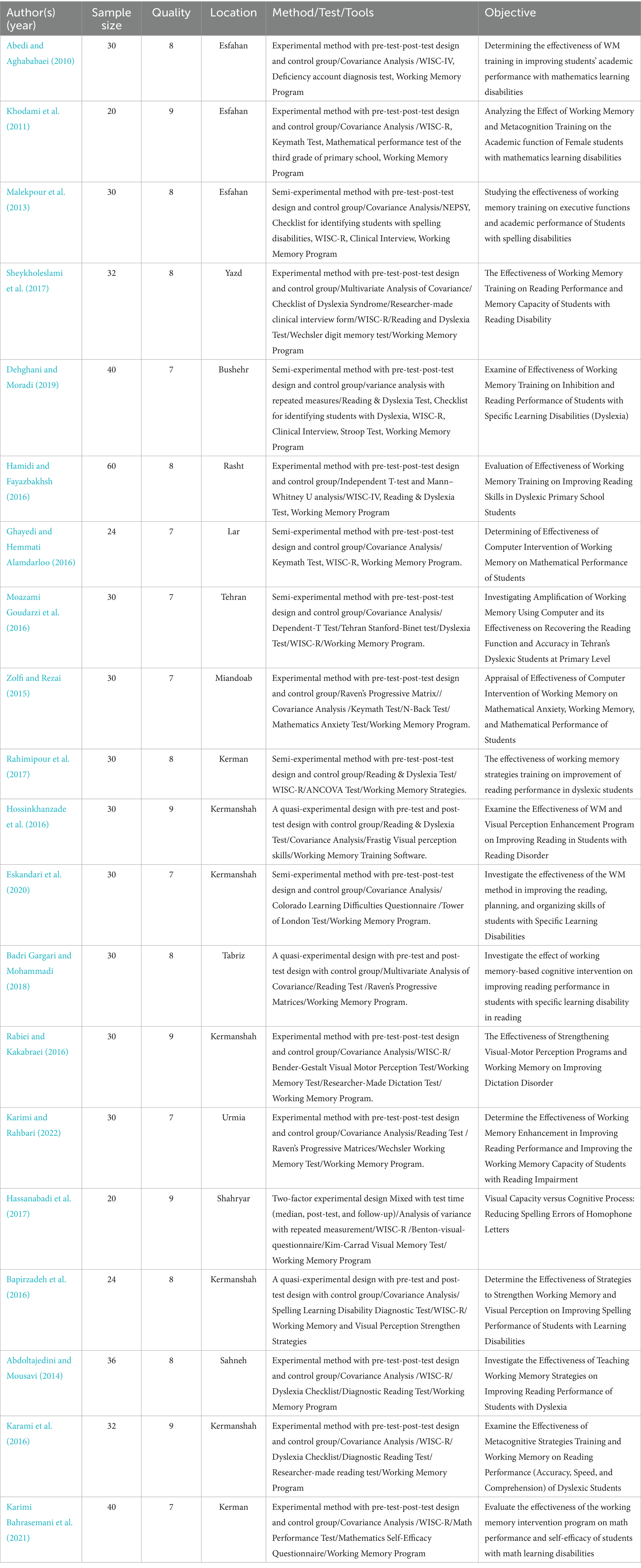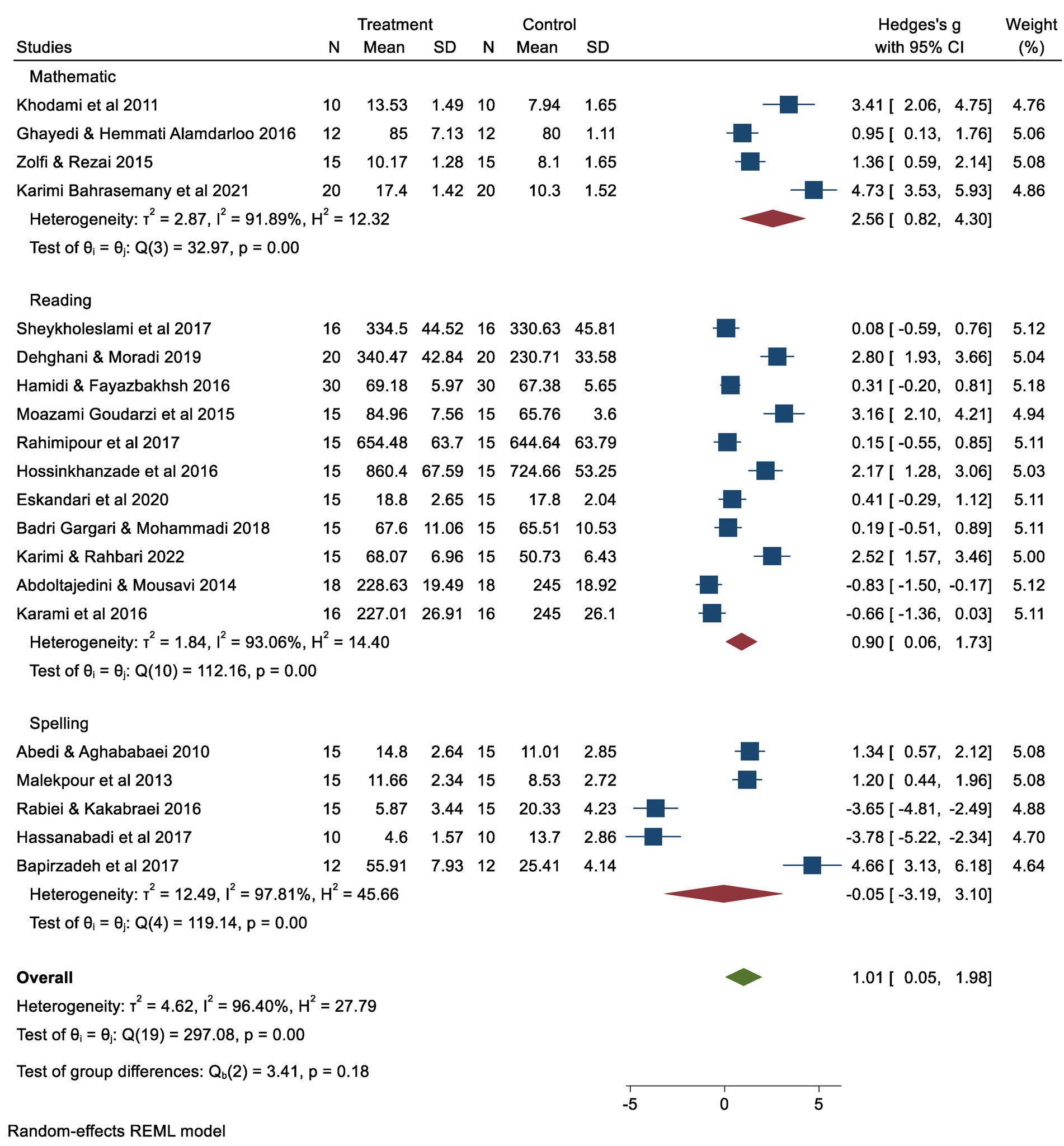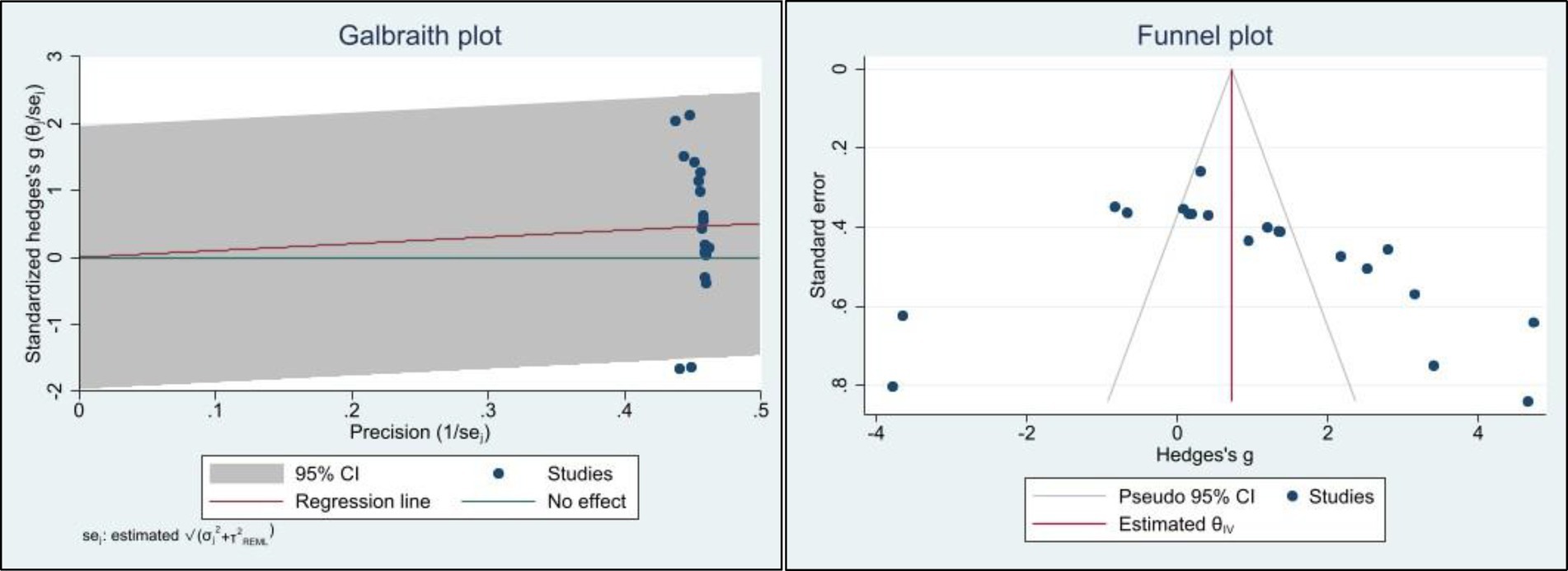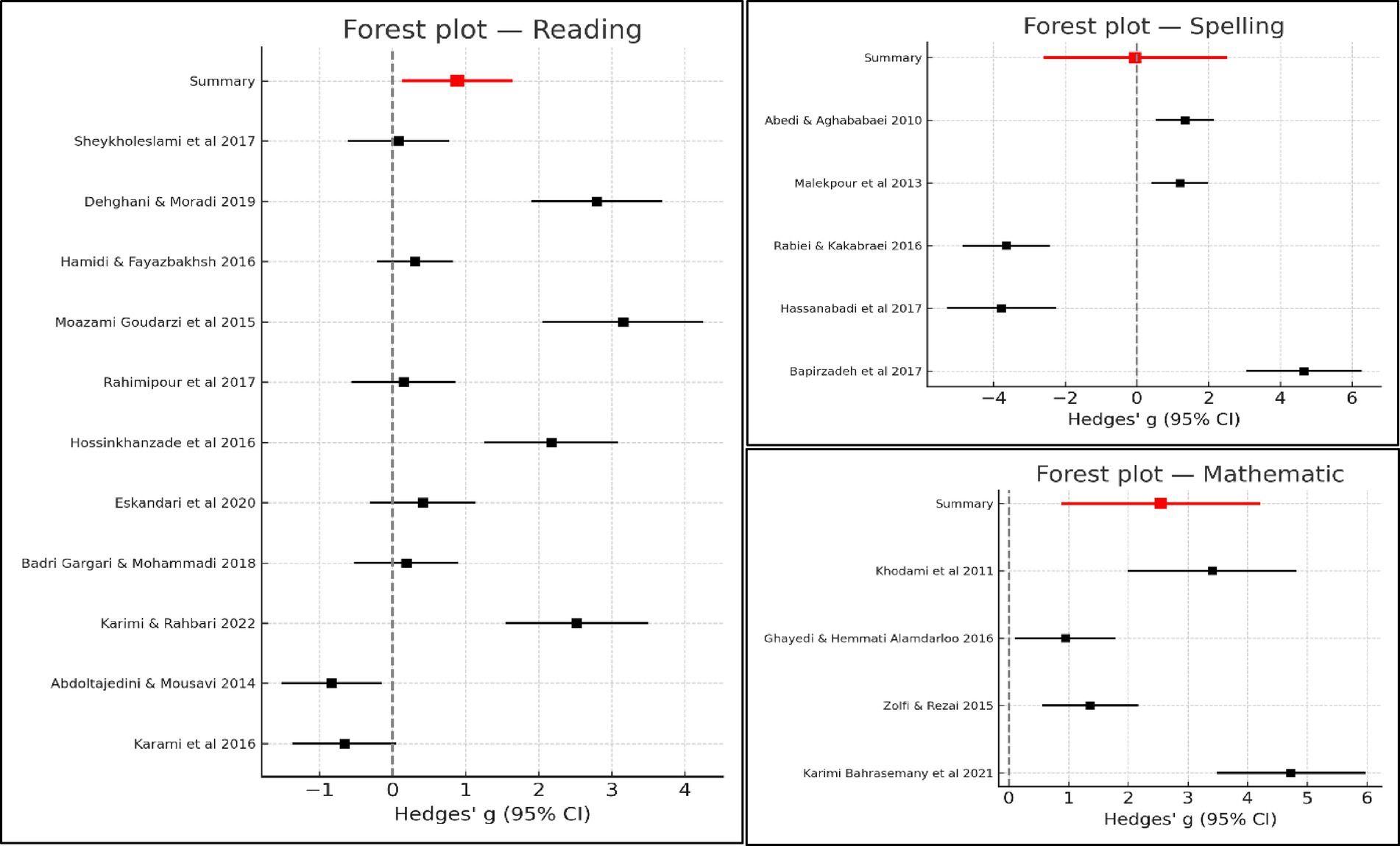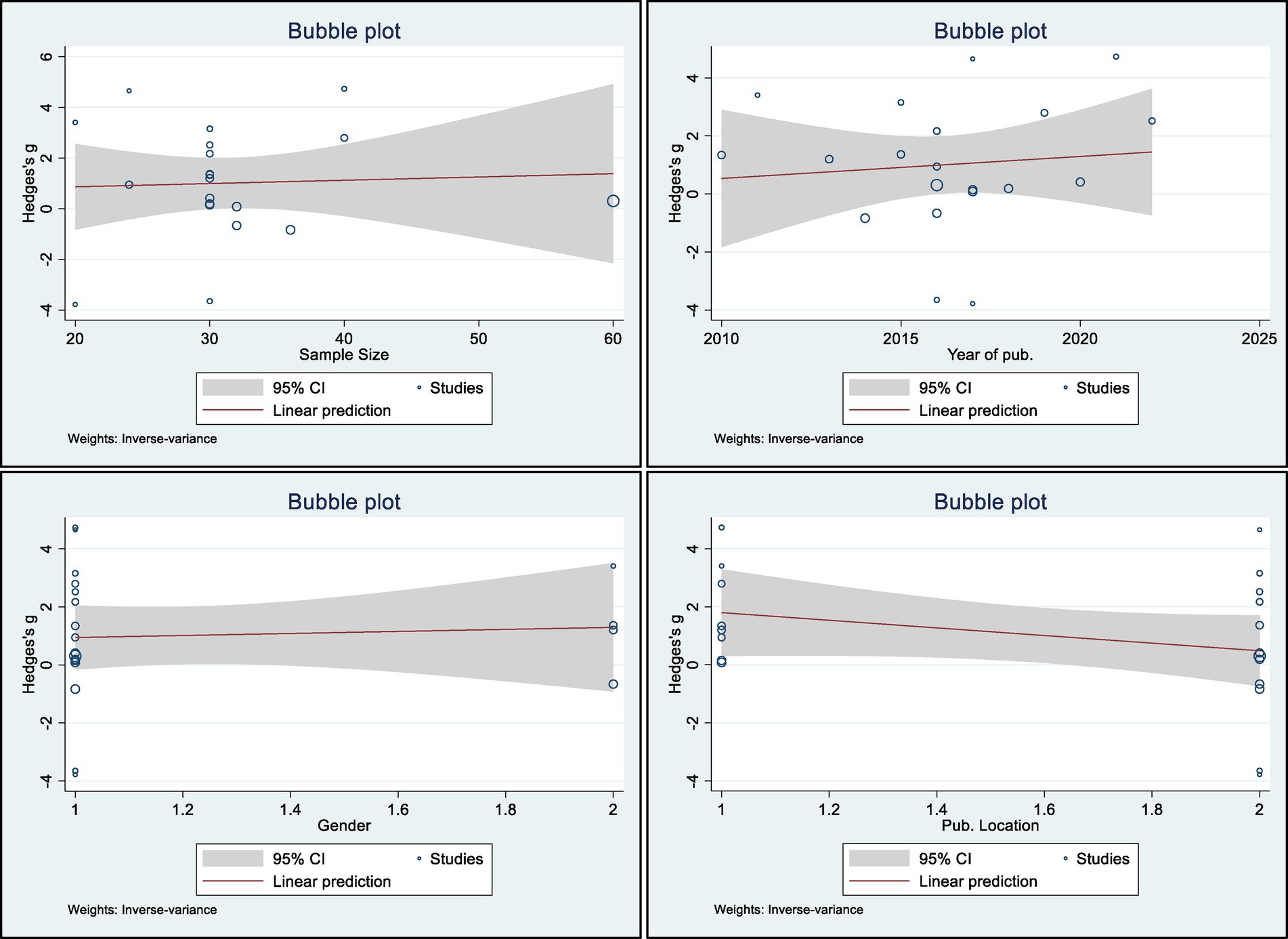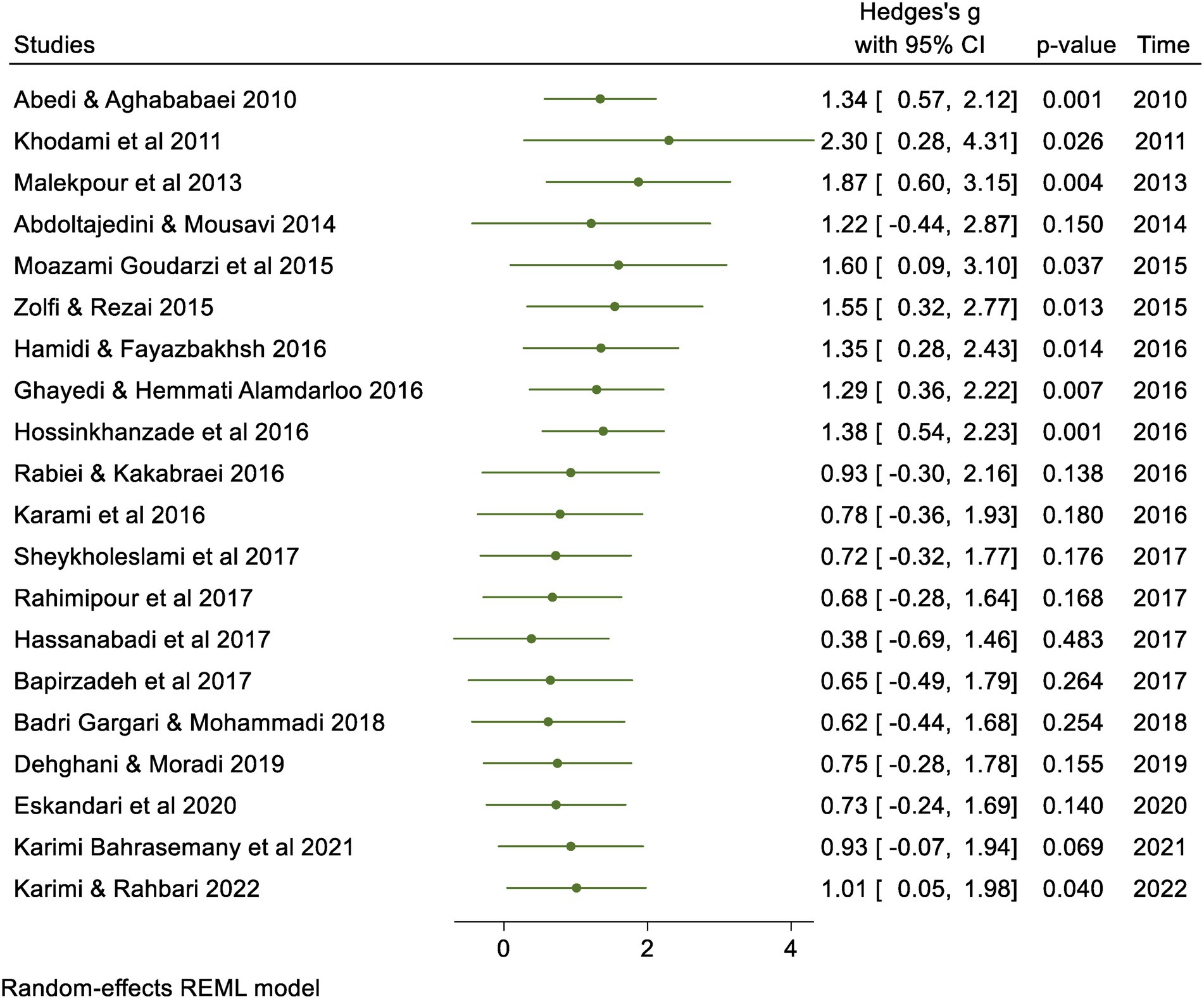- Department of Psychology and Educational Sciences, Institute of Psychology and Educational Sciences, University of Tehran, Tehran, Iran
Introduction: In the past several years, increasing interest has been in working memory training as a cognitive intervention to improve students’ academic performance. Despite the considerable interest in this topic, empirical support for the real efficacy of such interventions has been mixed and sometimes contradictory. This meta-analysis seeks to provide a systematic, evidence-based review of the functional effectiveness of working memory training.
Methods: For this purpose, we systematically searched all existing pertinent randomized controlled trials. The search was carried out both in major international academic databases, such as ScienceDirect, Elsevier, Wiley, Springer, Taylor & Francis, Scopus, PubMed, and Google Scholar, and reliable national databases, such as IranDoc, MagIran, SID, Noormags, and Civilica. This research produced 20 qualifying studies with 628 subjects.
Results: The findings manifested a high heterogeneity among the studies and an indication of publication bias. The overall effect size of the impact of working memory training on academic performance was computed as g=1.01 (95% CI [0.05, 1.98]), indicating a statistically significant effect. However, the observed heterogeneity and possible bias in different studies render the interpretation difficult and cast doubt on the external validity of the findings.
Discussion: These results highlight the necessity for additional research employing more rigorous and better-controlled methodologies to more effectively establish the efficacy of working memory interventions in school settings.
Introduction
Academic performance in different societies shows the efficacy and evolution of the educational system in the context of goal selection and attention to individual-social needs; therefore, academic performance refers to the person’s learned or acquired ability in school subjects, which is measured by standardized learning tests or by teacher-made tests (Rezaei et al., 2016). Although acquiring knowledge, a positive attitude, values, and skills in educational environments is not easy, Education as an influential factor has constantly improved society’s public health and helped people’s social and economic stability (Idris et al., 2012). Tentama and Abdillah (2019) study in Indonesia showed that students who had better academic performance in an educational environment experienced higher self-confidence, lower levels of anxiety and depression, more social participation, and less substance abuse, and even in the field of business, they were more dynamic and had a higher income. Reviewing Pham and Taylor (1999) “academic performance components” shows that emotions form a significant part of academic performance. In addition, the various findings directly pointed to the effect of emotions on learners’ educational function and brain functions, such as attention, concentration, memory, processing speed, information retrieval, inhibition, transfer, and use of strategies (Samadi et al., 2023). Findings in the cognitive field during the past three decades imply that working memory as a cognitive process plays a vital role in the etiology of learning disabilities (Dehn, 2008).
Working memory (WM) is a cognitive system that keeps and processes information for a short time (Fuchs et al., 2006; Holmes et al., 2009; Spencer-Smith and Klingberg, 2015). So far, various models of WM have been introduced in the cognitive science literature. Nevertheless, the most comprehensive and widely used WM model in learning disabilities is Baddeley’s model (Dehn, 2008). In this model, WM consists of essential components such as the central executive (for control and modulation of cognitive processes), phonological loop (for recording and storage of verbal and audio information), and visuospatial sketchpad (for storing the visual and spatial information) (Dehn, 2008; Sala and Gobet, 2019). In recent years, Baddeley has added a fourth component: the episodic buffer, which integrates the information of different parts of WM (Baddeley, 2012). Although Miller et al. (1960) first coined “working memory” in 1960, Baddeley and Hitch (1974) developed it as a multi-part model. Unlike simple short-term memory functions in providing short-term information storage, WM is a multi-component system that manipulates information storage. WM relies heavily on attention and other central executive processes and interacts with long-term memory (Cowan, 2008). According to Miyake and Shah (1999) perspective, working memory includes mechanisms involved in the active control, regulation, and maintenance of work-related information in the service of complex cognition, including new and skillful tasks. This model of memory is not a fixed “place” or “box” in cognitive architecture but includes multiple demo codes and different subsystems.
Neurocognitive findings indicate that oral and auditory information are more likely to activate Broca’s and Wernicke’s areas. In contrast, visual and spatial data are more likely to be processed in the right hemisphere (Baddeley, 2000b). In addition, the findings of Osaka et al. (2003), Owen et al. (2005), Chein et al. (2011), and Kim et al. (2015a, 2015b) showed that the dorsolateral prefrontal cortex (DLPFC), the anterior cingulate cortex (ACC), and the parietal cortex (PAR) function as memory neural networks when handling and storing information. More precisely, the DLPFC deeply intervenes in tasks such as information integration during decision-making that require executive control (Kim et al., 2015a, 2015b; Jimura et al., 2017). As an attention controller, the ACC is taken to evaluate and adjust the information received according to the task’s demands (Osaka et al., 2003). The PAR may be a workspace for sensory or cognitive processing (Owen et al., 2005; Andersen and Cui, 2009). In addition, the basal ganglia may enhance focus on a target while suppressing irrelevant distractors during verbal WM tasks, which is especially crucial during the encoding phase (Moore et al., 2013; Adams et al., 2018; Emch et al., 2019). Wilson and Swanson (2001), Jeffries and Everatt (2004), and Rosselli et al. (2006) showed that children who have problems in the field of reading and mathematics are likely to show WM deficiencies, especially in the phonological loop.
In Iran, more recent scientific evidence has revealed that children with learning disorder possess significantly lower working memory (WM) capacity compared to their age- and IQ-equivalent counterparts who develop typically. For example, Ramezani et al. (2021), employing a double-blind randomized controlled trial, revealed that dyslexic students have profound impairments of verbal WM and that incorporating an innovative “verbal working memory–balance” training program achieved tremendous improvements in WM performance and reading skills. In the same vein, Nazok et al. (2022) revealed that students with specific learning disorders possess reduced WM capacity compared to their counterparts and related such weakness directly to reduced academic performance. Furthermore, Kheiry Guileh Pordesari et al. (2024) revealed that multisensory teaching enhances the WM and mental processing speed of children with mathematical learning disorders, further confirming the overriding function of this mental ability in learning achievements. More recent work has further underscored the significance of working memory (WM) relative to intelligence quotient (IQ), finding that instead of IQ level, WM capacity serves as a better predictor of future attainment in academic spheres (Alloway and Alloway, 2010; Chooi, 2012; Alloway et al., 2013). In line with this, Mirmehdi et al. (2009) further found that WM training improved students’ reading and mathematics performance. From an applied standpoint, training programs in WM premising upon focused cognitively oriented tasks, like distraction control, multitasking, and retrieval of sequences, have proven helpful in upgrading cognitive flexibility and expanding WM capacity (Sala and Gobet, 2019). Furthermore, Melby-Lervåg and Hulme’s (2013) meta-analysis provided robust and multi-faceted evidence supporting the fact that WM training can significantly enhance the performance of students with learning problems. Furthermore, Muñez et al. (2022) and Ji and Guo (2023) have more recently underlined the critical role of WM capacity in handling mathematical sequences and unifying information of greater complexity. Zhao’s (2012) research has further demonstrated that WM training has a significant and direct impact on academic performance in technical and math-oriented fields. With a special focus on insights derived in cultural and educational contexts, this meta-analysis investigates the efficiency of WM training on the academic performance of Iranian students. Iran’s centralized curriculum, gender-segregated institutions, and strong religious and cultural underpinnings help to create a unique backdrop for assessing cognitive interventions. These elements will probably affect how WM training is received, and their effects will differentiate Iran from other educational environments. The structure of the Persian language is another crucial factor that might influence the cognitive routes connected in WM and, hence, change the academic influence of the training. This study aims to produce relevant and directly applicable results for local teaching and learning environments by concentrating only on studies conducted inside Iran. The study used the STATA meta-analytic instrument to support methodological precision, improving the outcomes’ accuracy and dependability. The ultimate objective of the study is to help teachers and legislators decide on the pragmatic worth of WM training in Iranian institutions, so opening the path for evidence-based, culturally informed interventions catered to the particular cognitive profiles of Iranian students.
Methods
The research was carried out as a systematic review and meta-analysis to analyze the impact of WM training interventions on Iranian students’ academic performance. It considered papers from 2000 to 2025, and the research process strictly adhered to PRISMA (Preferred Reporting Items for Systematic Reviews and Meta-Analyses) guidelines.
The research strategy
A systematic search was conducted in international and national databases to find relevant studies. International databases that were searched included PubMed, Web of Science, Scopus, Wiley, Springer, Google Scholar, and ScienceDirect. National databases SID, Irandoc, Noormags, Civilica, and MagIran were searched. A list of keywords, such as “working memory,” “academic performance,” “writing,” “reading,” “mathematics,” “dictation,” and “spelling,” were used separately and in combination with each other to have maximum coverage of existing scholarly literature.
Inclusion and exclusion criteria
Researchers collected all initial studies that examined WM training’s impacts on student academic success in reading, writing, and mathematics. Three independent reviewers examined titles and abstracts to find relevant articles before conducting full-text reviews on chosen studies. The research team addressed discrepancies by consulting with an additional researcher. To be included in the meta-analysis, studies were required to meet the following criteria: Studies needed to be published in English or Persian along with a structured WM training intervention, and participants typically developed students with normal IQ. Additionally, standardized and validated assessment tools were required, along with sufficient sample size and full-text article availability. We excluded studies that used qualitative methods, depended only on correlational approaches instead of experimental or quasi-experimental designs, or did not provide enough data for meta-analysis. The research team eliminated correlational studies from their analysis because these studies lack structured interventions and fail to determine causal links. Meta-analyses require aggregation of intervention effect sizes, so studies included had defined experimental protocols alongside control conditions. The selected approach maintained strict methodological standards and enabled trustworthy comparisons between studies.
Data extraction
The STROBE (Strengthening the Reporting of Observational Studies in Epidemiology) checklist was utilized to extract data and assess the methodological quality of the included scientific texts. They were given a score if the desired items were observed in the analyzed texts. Otherwise, they were given a zero score. The score range of this checklist was between 0 and 10, and higher scores indicated higher methodological quality. Based on the checklist score, the texts were divided into three categories: weak (scores below 4), mean (scores between 4 and 7), and strong (scores more than 7) (Gallo et al., 2012).
Statistical analysis
We performed all statistical analyses with STATA version 17. The researchers produced a forest plot that synthesized and visualized the collective impact of working memory training on academic performance by displaying pooled effect sizes from multiple studies alongside their 95% confidence intervals (CI). The graphical representation enables direct evaluation of individual study data alongside their precision levels and the combined effect estimate while making effect size interpretation more understandable across multiple studies. The assessment of heterogeneity in the included studies involved the I2 statistic alongside Cochran’s Q test and the Galbraith plot. The I2 index measures the percentage of total variation that stems from between-study differences instead of random error, and values above 75% suggest substantial heterogeneity. The analysis showed that I2 surpassed the established limit while the Q test produced significant findings (p = 0.01), which confirmed substantial heterogeneity among studies. The Galbraith plot served as a visual diagnostic method alongside statistical analyses to identify studies that disproportionately affect heterogeneity. The plot represents standardized effect sizes plotted against the inverse of their standard errors to identify potential outliers or sources of inconsistency through deviations from the expected linear trend. Researchers used a random-effects model to estimate the combined effect size after identifying significant heterogeneity in the data. The random-effects model operates under the principle that actual effects differ across studies by integrating both within and between. This act makes it suitable for situations with both methodological and clinical variation. Funnel plots were used to evaluate publication bias by analyzing the symmetry between effect sizes and study precision. The asymmetry in data plots can demonstrate potential publication bias through selective reporting of significant findings. The analysis of publication bias in this review depended on visual inspection of the funnel plot to ascertain its influence on the strength of the meta-analytic results. The data extraction process involved thorough examination to classify studies that contained control groups properly. The final analysis incorporated only those studies that provided detailed and comparable data across both intervention and control groups. The analysis excluded studies with incomplete or non-comparable group data to maintain methodological integrity and analytical validity of the findings.
Findings
A systematic search in its first stage resulted in 505 relevant articles from scientific databases across national and international platforms, with 143 articles from global databases and 362 from national databases. The initial screening process removed 212 duplicate entries. The screening of titles and abstracts resulted in the exclusion of 251 articles because they did not fulfill the established inclusion criteria. The main reasons for excluding studies were non-experimental structures and research focused on specialized populations lacking a comparison group and a missing direct relevance to the intended target variables. Detailed examination was conducted on the complete texts of the 41 remaining articles. The detailed review eliminated 22 studies because of multiple methodological and reporting deficiencies. Excluded studies used non-standardized tools that lacked verified reliability, validity, cultural adaptation reports, inadequate statistical information, missing means, standard deviations, or group-specific outcomes. Studies with designs that did not fit quantitative synthesis requirements were removed from consideration at this stage. The final meta-analysis included 20 studies with 628 participants that fulfilled the predefined eligibility criteria (Figure 1). Seven studies took place in Isfahan and Kermanshah, and the other 13 occurred across various regions of Iran. Research participants in the studies ranged in age from 9 to 12 years. The research team used the STROBE checklist to evaluate the methodological quality of the selected studies (Table 1).
This meta-analysis, which used Hedges’ g to measure the effect of WM training on student academic performance, showed an aggregated effect size of 1.01 with a 95% CI [0.05, 1.98] according to the forest plot (Figure 2). The calculated value indicates moderate to substantial positive effects, while the broad confidence interval with a lower boundary near zero suggests we should interpret the actual effect size with caution. The Galbraith plot evaluated the uniformity of findings from different studies, as visualized in Figure 3. The diagnostic tool demonstrates high effectiveness in identifying statistical heterogeneity along with studies that deviate from expected patterns. The current analysis revealed two studies that fell beyond the 95% confidence limits, demonstrating significant heterogeneity. Variations in intervention protocols, sample characteristics, measurement tools, or implementation fidelity can explain the observed variability across study outcomes. Publication bias was evaluated by applying both the funnel plot and Begg’s test. When studies show no bias, their distribution around the central axis of the funnel plot should be symmetrical to demonstrate equal reporting of significant and non-significant findings. Visual examination showed asymmetry since five studies did not follow the anticipated distribution pattern, which suggests potential publication bias. Statistical confirmation of the observed asymmetry emerged from Begg’s test, which produced a p-value below 0.001, showing substantial unevenness in how effect sizes related to study precision were distributed. The findings indicate that smaller and non-significant studies may not have been published or reported, leading to overestimating the real effect size. The positive impact of WM training on academic performance is evident yet requires cautious examination because heterogeneity and publication bias affect the interpretation of findings. Researchers should direct future studies toward strong methodological frameworks, clear reporting methods, and improved management of moderating variables to enhance their findings’ validity and generalizability.
A subgroup sensitivity analysis was carried out using the leave-one-out technique. This included all 20 studies, grouped into three subgroups: Reading, Spelling, and Mathematics (Figure 4). The key findings were:
Reading (k = 11): The combined random-effects measure (Hedges’ g = 0.885, 95% CI: 0.153–1.617; I2 = 90.9%, Q = 109.59, df = 10) showed a positive, statistically significant effect. Within this reading subgroup, the effect size remained between 0.673 and 1.059 when each study was excluded in turn through the leave-one-out analysis. Occasionally, the lower 95% CI briefly touched zero (minimum LCL = −0.02), but the effect direction always favored the intervention. Despite large heterogeneity, likely due to differences in instruments, populations, and protocols, these findings indicate a positive impact. Spelling (k = 5): No combined random-effects estimate was significant (g = −0.044, 95% CI: −2.562 to 2.473; I2 = 96.5%, Q = 112.90, df = 4). There was extreme heterogeneity. Leave-one-out analysis revealed a wide variation in effect size (range: −1.164 to +0.860), with all confidence intervals overlapping zero. These results suggest no consistent or significant effect in this subgroup. Mathematics (k = 4): The random-effects pooled estimate was large and significant (g = 2.546, 95% CI: 0.904–4.187; I2 = 90.6%, Q = 31.86, df = 3). In leave-one-out analysis, the effect size ranged from 1.768 to 3.125, with all 95% CIs above zero. This shows the effect is robust. No single study significantly influenced the results, although high heterogeneity persisted (Figure 4).
The research utilizes bubble plots (Figure 5) to demonstrate the connection between effect size and selected moderator variables through an easy-to-understand visual approach. In these plots, moderators such as sample size, year of publication, gender, and publication location are displayed along the horizontal (X) axis. The vertical (Y) axis features the plotted effect size in these bubble plots. The size of each bubble on the plot represents the statistical weight or precision of its corresponding study within the meta-analytic model. Within this analysis, larger bubbles indicate studies that contribute more significantly to the pooled effect estimate. Each plot contains a regression line to demonstrate the data’s overall trend. The shaded region around the line represents the 95% confidence interval, which functions as a visual indicator of the uncertainty level related to the trend. The regression analyses performed on these visualizations showed that none of the moderator variables tested reached statistical significance as predictors of effect size. The moderators examined showed no explanatory power for the observed heterogeneity between studies because R2 remained 0.00. The data analysis demonstrates that the assessed moderators fail to account for effect size variations, while unidentified factors may explain the observed heterogeneity.
The cumulative meta-analysis chart illustrates temporal changes in effect sizes from reading, mathematics, and writing performance studies, which compared intervention groups to control groups. The variations of effect sizes over time reveal instability in aggregated results, which demands the implementation of more thorough research methods in this area (Figure 6). This analytical method enables researchers to evaluate how new studies affect the overall effect estimate. The cumulative forest plot is a vital tool to illustrate how combined effects evolve by representing study contributions and their joint progression. Point estimates of effect size for studies appear as green circles, while horizontal lines in the visualization represent their 95% confidence intervals. Color and shading techniques guide viewers to perceive the larger pattern while reducing attention to individual study results. The Hedges’ g score decreased from 1.34 to 1.01 following the inclusion of more research studies into the analysis. The confidence interval became significantly narrower, moving from [0.57, 2.12] to [0.05, 1.98], which indicated improved precision and stability in the estimate. Despite its reduction relative to the initial estimate, the final effect size remains statistically significant, with the confidence interval’s lower bound approaching zero. Students’ academic performance benefits from the intervention at a moderate level of effectiveness. Model adjustments that include bigger and more rigorous studies demonstrate a decrease in effect size by correcting inflated outcomes from weaker research. Cumulative meta-analysis enables us to track evolving effect sizes and gain a transparent understanding of the research findings’ relevance and accuracy.
Discussion
A comprehensive review of 20 randomized controlled trials that met moderate to high standards of methodological quality provides strong evidence supporting the positive impact of working memory training on student academic performance. Students demonstrate the most significant improvements from working memory training in their performance on mathematics, reading, and writing tasks. The average effect size, measured using Hedges’ g = 1.01; 95% CI: The calculated range for Hedges’ g from 0.05 to 1.98 demonstrates that the academic performance impact of working memory training is statistically significant. The statistical analysis demonstrated high heterogeneity among studies, evidenced by an I2 value of 96.4 and an H2 value of 27.79. The considerable variation observed appears to result from multiple factors, including how programs are structured alongside variations in sample demographics and cultural environments, and the different tools used for evaluation. The meta-regression investigated several factors, including sample size, year of publication, gender, and publication location, but found no significant effect size moderators among them. The findings of the present meta-analysis underscore the critical role of working memory (WM) capacity as a significant predictor and enhancer of students’ academic performance. These results are consistent with established cognitive frameworks that conceptualize working memory (WM) as a dynamic system acting as an intermediary between short-term and long-term memory, enabling the simultaneous maintenance and processing of complex information (Cowan, 2008). Strengthening this cognitive component through targeted educational interventions not only enhances core cognitive processes, such as attention, problem-solving, and information organization, but also significantly impacts academic achievement. Neuropsychological evidence has identified the involvement of specific brain regions, including the anterior cingulate cortex (ACC), the dorsolateral prefrontal cortex (DLPFC), and parietal areas, in regulating various working memory (WM) components and cognitive control mechanisms (Kim et al., 2015a, 2015b; Osaka et al., 2003). Dysfunction in these neural structures, particularly within the phonological subsystem, has been significantly associated with learning disorders such as difficulties in reading and mathematics (Rosselli et al., 2006; Wilson and Swanson, 2001). Thus, designing educational interventions that specifically target the activation and reinforcement of these brain regions may offer a solid scientific foundation for improving cognitive and academic outcomes.
From these meta-analytic findings, working memory (WM) training produces the strongest and most reliable effects in the near-transfer field, where improvements are predominantly restricted to the proximally related task, training structure, and content domains. In contrast, far transfer, the broader generalization of such improvement to novel or task-irrelevant learning situations, continues to be sporadic, and, across most cases, of small magnitude. This pattern resembles the larger global WM literature, where meta-analyses and systematic reviews (Melby-Lervåg and Hulme, 2013; Sala and Gobet, 2019) consistently show impressive short-term, task-specific improvements but more restricted and heterogeneous cross-domain transfers. Such convergence underscores the necessity of a more mechanism-sensitive research program that informs the cognitive and environmental moderators of transfer and the particular situations under which such transfer is most likely to be obtained.
These results are subject to cautious interpretation from practice and policy perspectives. We do not support the premature widespread adoption of WM training into national curricula due to the extreme methodological heterogeneity of intervention designs and outcomes reporting. Instead, we support earmarked pilot programs in selected teaching or clinical settings to demonstrate feasibility, scalability, and long-term efficacy in ecologically valid settings. Pilot trials should utilize stringent experimental designs, such as heterogeneous student samples, and assess cognitive and functional outcomes to establish a robust, favorable database for broader adoption. For teachers and course developers, best practice informed by evidence suggests incorporating teaching subject matter as an everyday feature of approaches favorable to working memory, rather than relying solely on stand-alone packages of WM training. These approaches are composed of short, focused exercises of recall, processes of scaffolding of problem solving, and teaching explicit strategies of management of cognitive load when undertaking complex learning tasks—all methods proven and validated by converging evidence across the worldwide literature (Gathercole and Alloway, 2008; Holmes et al., 2009). For policymakers, the development of formally structured, multi- and transdisciplinary collaborations among researchers, teachers, and clinical practitioners has the potential to refine working memory interventions iteratively and ensure that a cumulative, cross-cultural base of excellent evidence informs policy decisions. A slow, evidence-informed path, with intensified pilot implementations, frequent assessments, and cross-sector collaboration, holds the most tremendous potential for optimizing WM training among heterogeneous student populations. This path reduces the risk of scaling up too quickly and provides the most significant potential for achieving sustainable, generalizable gains in educational equity and cognitive development at scale.
Conclusion
The present study showed that training WM in children can improve their academic performance in reading, mathematics, and writing. In other words, WM training helps students process textual information more deeply and understand its meaning, progress significantly in reading speed and accuracy, manipulate information related to mathematical operations more accurately, and avoid distraction by focusing and paying closer attention to the words. Furthermore, meta-regression analyses showed that the memory-based interventions’ effect size on academic performance was not moderated by variables such as location, gender, year of publication, sample size, and age.
Limitations
One limitation of the present research is the heterogeneity between studies and the publication bias related to them, which challenges us in accurately determining the effectiveness of the WM training programs. In addition, and unfortunately, since many studies conducted in Iran lacked information and did not use appropriate statistical methods, they could not be included in this meta-analysis. Another area for improvement of the present research is that its findings only concern Iranian students, making it difficult to generalize our findings to other societies. This study opens new perspectives for future meta-analyses.
Data availability statement
The raw data supporting the conclusions of this article will be made available by the authors, without undue reservation.
Author contributions
AM: Conceptualization, Data curation, Formal analysis, Funding acquisition, Investigation, Methodology, Project administration, Resources, Software, Supervision, Validation, Visualization, Writing – original draft, Writing – review & editing. EH: Conceptualization, Data curation, Formal analysis, Funding acquisition, Investigation, Methodology, Project administration, Resources, Software, Supervision, Validation, Visualization, Writing – original draft, Writing – review & editing. MS: Conceptualization, Data curation, Formal analysis, Funding acquisition, Investigation, Methodology, Project administration, Resources, Software, Supervision, Validation, Visualization, Writing – original draft, Writing – review & editing. YH: Conceptualization, Data curation, Formal analysis, Funding acquisition, Investigation, Methodology, Project administration, Resources, Software, Supervision, Validation, Visualization, Writing – original draft, Writing – review & editing. HG: Conceptualization, Data curation, Formal analysis, Funding acquisition, Investigation, Methodology, Project administration, Resources, Software, Supervision, Validation, Visualization, Writing – original draft, Writing – review & editing.
Funding
The author(s) declare that no financial support was received for the research and/or publication of this article.
Acknowledgments
The authors have utilized Grammarly to refine their grammar and typography, and we would like to express our appreciation to the creators. However, the tool has only been used to improve the clarity and readability of the text. Therefore, the authors conducted all the scientific analyses and drew the conclusions presented in this article.
Conflict of interest
The authors declare that the research was conducted in the absence of any commercial or financial relationships that could be construed as a potential conflict of interest.
Publisher’s note
All claims expressed in this article are solely those of the authors and do not necessarily represent those of their affiliated organizations, or those of the publisher, the editors and the reviewers. Any product that may be evaluated in this article, or claim that may be made by its manufacturer, is not guaranteed or endorsed by the publisher.
References
Abdoltajedini, S. H., and Mousavi, F. (2014). “The effectiveness of training working memory strategies in improving the learning disabilities of elementary school boys in Sahneh city,” in The first National Conference on sustainable development in educational sciences and psychology, social and cultural studies, Tehran.
Abedi, A., and Aghababaei, S. (2010). The effectiveness of working memory training on improving children's academic performance with dyscalculia. J. Clin. Psychol. 2, 73–81.
Adams, E. J., Nguyen, A. T., and Cowan, N. (2018). Theories of working memory: differences in definition, degree of modularity, role of attention, and purpose. Lang. Speech Hear. Serv. Sch. 49, 340–355. doi: 10.1044/2018_LSHSS-17-0114
Alloway, T. P., and Alloway, R. G. (2010). Investigating the predictive roles of working memory and IQ in academic attainment. J. Exp. Child Psychol. 106, 20–29. doi: 10.1016/j.jecp.2009.11.003
Alloway, T. P., Bible, V., and Lau, G. (2013). Computerized working memory training: can it lead to gains in cognitive skills in students? Comput. Human Behav. 29, 632–638. doi: 10.1016/j.chb.2012.10.023
Andersen, R. A., and Cui, H. (2009). Review intention, action planning, and decision-making in parietal-frontal circuits. Neuron 63, 568–583. doi: 10.1016/j.neuron.2009.08.028
Baddeley, A. D. (2000b). Short-term and working memory. The Oxford handbook of memory. Oxford: Oxford University Press.
Baddeley, A. (2012). Working memory: theories, models, and controversies. Annu. Rev. Psychol. 63, 1–29. doi: 10.1146/annurev-psych-120710-100422
Baddeley, A. D., and Hitch, G. (1974). Working memory. Psychol. Learn. Motiv. 8, 47–89. doi: 10.1016/S0079-7421(08)60452-1
Badri Gargari, R., and Mohammadi, D. (2018). Effect of working memory-based cognitive interventions on improving Reading performance in students with specific learning disability in Reading. Iranian J. Pediatr. Nurs. 5, 29–36. doi: 10.21859/jpen-05025
Bapirzadeh, E., Musavi, S. V., and Hossein-Khanzadeh, A. A. (2016). The effectiveness of strategies to strengthen working memory and visual perception on improving spelling performance of students with learning disabilities. Middle Eastern J. Disability Stu. 6, 177–183. Available at: http://jdisabilstud.org/article-1-563-en.html
Chein, J. M., Moore, A. B., and Conway, A. R. A. (2011). NeuroImage domain-general mechanisms of complex working memory span. NeuroImage 54, 550–559. doi: 10.1016/j.neuroimage.2010.07.067
Chooi, W. T. (2012). Working memory and intelligence: a brief review. J. Educ. Dev. Psychol. 2, 42–50. doi: 10.5539/jedp.v2n2p42
Cowan, N. (2008). What are the differences between long-term, short-term, and working memory? Prog. Brain Res. 169, 323–338. doi: 10.1016/S0079-6123(07)00020-9
Dehghani, Y., and Moradi, N. (2019). The effectiveness of working memory training on inhibition and Reading performance of students with specific learning disabilities(dyslexia). Neuropsychology 4, 123–142. doi: 10.30473/clpsy.2019.43389.1382
Emch, M., Von Bastian, C. C., and Koch, K. (2019). Neural correlates of verbal working memory: an fMRI Meta-analysis. Front. Hum. Neurosci. 13:180. doi: 10.3389/fnhum.2019.00180
Eskandari, S., Kakabraee, K., Amiri, H., and Hoseini, S. S. (2020). The effectiveness of active memory training on improving Reading skills and planning and organizing students with specific learning disabilities. Q. J. Res. School Virtual Learning 7, 27, 89–97. doi: 10.22034/ceciranj.2019.192979.1228
Fuchs, L. S., Fuchs, D., Compton, D. L., Powell, S. R., Seethaler, P. M., Capizzi, A. M., et al. (2006). The cognitive correlates of third-grade skill in arithmetic, algorithmic computation, and mathematical problem solving. J. Educ. Psychol. 98, 29–43. doi: 10.1037/0022-0663.98.1.29
Gallo, V., Egger, M., McCormack, V., Farmer, P. B., Ioannidis, J. P., Kirsch-Volders, M., et al. (2012). STrengthening the reporting of OBservational studies in epidemiology--molecular epidemiology (STROBE-ME): an extension of the STROBE statement. Mutagenesis 27, 17–29. doi: 10.1093/mutage/ger039
Gathercole, S. E., and Alloway, T. P. (2008). Working memory and learning: A practical guide for teachers. London: SAGE.
Ghayedi, E., and Hemmati Alamdarloo, G. H. (2016). The effectiveness of computer-assisted working memory training on mathematical performance of students with mathematic disability. J. Psychol. Stu. 11, 119–136.
Hamidi, F., and Fayazbakhsh, M. (2016). Effectiveness of working memory training on improving Reading skills in dyslexic primary school students. J. Instr. Eval. 9, 13–35. Available at: https://sanad.iau.ir/en/Journal/jinev/Article/972461
Hassanabadi, H., Jesri, N., and Noury Ghasemabadi, R. (2017). Visual capacity versus cognitive process: reducing spelling errors of homophone letters. J. Dev. Psychol. 14, 285–304. Available at: https://sanad.iau.ir/en/Journal/jip/Article/1054895
Holmes, J., Gathercole, S. E., and Dunning, D. L. (2009). Adaptive training leads to sustained enhancement of poor working memory in children. Dev. Sci. 12, F9–F15. doi: 10.1111/j.1467-7687.2009.00848.x
Hossinkhanzade, A. A., Azadimanesh, P., Mohammadi, H., Ahmadi, S., and Sadeghi, S. (2016). The effectiveness of programs to strengthen working memory and visual perception on improving Reading students with Reading disorder. J. Psychol. Stu. 12, 49–66. doi: 10.22051/psy.2016.2383
Idris, F., Hassan, Z., Ya’acob, A., Gill, S., and Awal, N. (2012). The role of education in shaping youth’s national identity. Procedia. Soc. Behav. Sci. 59, 443–450. doi: 10.1016/j.sbspro.2012.09.299
Jeffries, S., and Everatt, J. (2004). Working memory: its role in dyslexia and other specific learning difficulties. Dyslexia 10, 196–214. doi: 10.1002/dys.278
Ji, L., and Guo, Y. (2023). Working memory and mathematical problem solving: the role of sequential processing. J. Cogn. Dev. 24, 25–40. doi: 10.1080/15248372.2023.1234567
Jimura, K., Chushak, M. S., Westbrook, A., and Braver, T. S. (2017). Intertemporal decision-making involves prefrontal control mechanisms associated with working memory. Cereb. Cortex 28, 1105–1116. doi: 10.1093/cercor/bhx015
Karami, J., Momeni, K., and Abbasi, Z. (2016). The effectiveness of metacognitive strategies and working memory training on reading performance (accuracy, speed and comprehension) of students with dyslexia. Psychol. Achievements 23, 51–68. doi: 10.22055/psy.2017.12621
Karimi Bahrasemani, A., Chorami, M., Sharifi, T., and Ghazanfari, A. (2021). Effectiveness of working memory intervention on student’s mathematical performance and self-efficacy with math learning disorder. Neuropsychology 7, 59–72. doi: 10.30473/clpsy.2020.53996.1562
Karimi, S., and Rahbari, P. (2022). The effectiveness of working memory capacity enhancement in improving Reading performance and Strengthening working memory in students with learning disabilities. J. New Adv. Psychol. Educ. Training 4, 116–127. Available at: https://www.jonapte.ir/showpaper/7636825
Kheiry Guileh Pordesari, H., Moghtader, L., and Asadi Majreh, S. (2024). The effectiveness of multisensory instruction on processing speed, working memory, and visual-motor coordination of children with mathematics learning disorder. J. Modern Psychol. Res. 19, 111–120. doi: 10.22034/jmpr.2023.58787.5885
Khodami, N., Abedi, A., and Atashpoor, H. (2011). The effect of working memory and metacognition training on the academic function of female students with mathematics learning disabilities. Know. Res. Appl. Psychol. 12, 45–53. Available at: https://sanad.iau.ir/en/Journal/jsrp/Article/892519
Kim, S. H., Kim, M. S., and Chun, M. M. (2015b). Neural correlates of attentional control in working memory. NeuroImage 108, 394–404. doi: 10.1016/j.neuroimage.2014.12.045
Kim, C., Kroger, J. K., Calhoun, V. D., and Clark, V. P. (2015a). The role of the frontopolar cortex in manipulation of integrated information in working memory. Neurosci. Lett. 595, 25–29. doi: 10.1016/j.neulet.2015.03.044
Malekpour, M., Aghababaei, S., Abedi, A., and Shooshtari, M. (2013). The efficacy of working memory training on executive functions and academic performance of 3rd grade elementary female students with spelling learning disability. Psychol. Excep. Ind. 3, 1–20. Available at: https://jpe.atu.ac.ir/article_2169.html?lang=en
Melby-Lervåg, M., and Hulme, C. (2013). Is working memory training effective? A meta-analytic review. Dev. Psychol. 49, 270–291. doi: 10.1037/a0028228
Miller, G. A., Galanter, E., and Pribram, K. H. (1960). Plans and the structure of behavior. New York, NY: Holt, Rinehart and Winston.
Mirmehdi, S. R., Alizadeh, H., and Seif Naraghi, M. (2009). The impact of training executive functions on mathematics and Reading performance in primary students with specific learning disabilities. J. Except. Child. 9, 1–12. Available at: http://joec.ir/article-1-327-en.html
Miyake, A., and Shah, P. (1999). Models of working memory: Mechanisms of active maintenance and executive control. New York, NY: Cambridge University Press.
Moazami Goudarzi, S., Farokhi, N., Goudarzi, K., and Nazari, M. (2016). The effectiveness of working memory strategies training by using of computerized on improvement of reading performance and comprehension reading in students with dyslexia. J. Learn. Disabil. 5, 108–121. Available at: https://jld.uma.ac.ir/article_411.html?lang=en
Moore, A. B., Li, Z., Tyner, C. E., Hu, X., and Crosson, B. (2013). Bilateral basal ganglia activity in verbal working memory. Brain Lang. 125, 316–323. doi: 10.1016/j.bandl.2012.05.003
Muñez, D., Lee, K., Bull, R., Khng, K. H., Cheam, F., and Rahim, R. A. (2022). Working memory and numeracy training for children with math learning difficulties: evidence from a large-scale implementation in the classroom. J. Educ. Psychol. 114, 1866–1880. doi: 10.1037/edu0000732
Nazok, N., Akbarfahimi, M., Ghaffari, A., and Parand, A. (2022). Effectiveness of the combined memory training program on memory skills and school achievement of children with specific learning disorders: a pilot randomized controlled trial. J. Modern Rehab. 16, 170–179. doi: 10.18502/jmr.v16i2.9304
Osaka, M., Osaka, N., Kondo, H., Morishita, M., Fukuyama, H., Aso, T., et al. (2003). The neural basis of individual differences in working memory capacity: an fMRI study. NeuroImage 18, 789–797. doi: 10.1016/S1053-8119(02)00032-0
Owen, A. M., McMillan, K. M., Laird, A. R., and Bullmore, E. (2005). N-back working memory paradigm: a meta-analysis of normative functional neuroimaging studies. Hum. Brain Mapp. 25, 46–59. doi: 10.1002/hbm.20131
Pham, L. B., and Taylor, S. E. (1999). From thought to action: effects of process-versus outcome-based mental simulations on performance. Personal. Soc. Psychol. Bull. 25, 250–260. doi: 10.1177/0146167299025002010
Rabiei, A., and Kakabraei, K. (2016). The effectiveness of Strengthening visual-motor perception programs and working memory on improving dictation disorder. J. Psychol. Educ. Sci. Stu. 2, 25–34. Available at: http://www.noormags.ir/view/fa/articlepage/1183523
Rahimipour, T., Ghazanfari, F., and Ghadampour, E. (2017). The effectiveness of working memory strategies training on improvement of reading performance in dyslexic students. Know. Res. Appl. Psychol. 18:70, 52–61. Available at: https://sanad.iau.ir/en/Journal/jsrp/Article/892384
Ramezani, M., Behzadipour, S., Pourghayoomi, E., Joghataei, M. T., Shirazi, E., and Fawcett, A. J. (2021). Evaluating a new verbal working memory–balance program: a double-blind, randomized controlled trial study on Iranian children with dyslexia. BMC Neurosci. 22:55. doi: 10.1186/s12868-021-00660-1
Rezaei, A., Jahan, F., and Rahimi, M. (2016). Academic performance: the role of achievement goals and achievement motivation. Educ. Psychol. 12, 155–171. doi: 10.22054/jep.2016.7387
Rosselli, M., Matute, E., Pinto, N., and Ardila, A. (2006). Memory abilities in children with subtypes of dyscalculia. Dev. Neuropsychol. 30, 801–818. doi: 10.1207/s15326942dn3003_3
Sala, G., and Gobet, F. (2019). Cognitive training does not enhance general cognition. Trends Cogn. Sci. 23, 9–20. doi: 10.1016/j.tics.2018.10.004
Samadi, Z., Golizadeh, Z., and Mirzaei, L. (2023). Meta-analysis of the effectiveness of teaching emotion regulation strategies on the components of academic performance. J. Soc. Psychol. 11, 53–75. Available at: https://journals.iau.ir/article_705855_89979b92a87462cdd6b431068cff2803.pdf
Sheykholeslami, A., Bakhshayesh, A., Barzegar-Bafrooei, K., and Moradi Ajami, V. (2017). The effectiveness of working memory training on Reading performance and memory capacity of students with Reading disability. J. Clin. Psychol. 9, 47–58.
Spencer-Smith, M., and Klingberg, T. (2015). Benefits of a working memory training program for inattention in daily life: a systematic review and meta-analysis. PLoS One 10:e0119522. doi: 10.1371/journal.pone.0119522
Tentama, F., and Abdillah, M. H. (2019). Student employability is examined from academic achievement and self-concept. Int. J. Eval. Res. Educ 8, 243–248. doi: 10.11591/ijere.v8i2.18128
Wilson, K. M., and Swanson, H. L. (2001). Are mathematics disabilities due to a domain-general or a domain-specific working memory deficit? J. Learn. Disabil. 34, 237–248. doi: 10.1177/002221940103400304
Zhao, Y. (2012). Shuxue Lingyu Zhishi Xuexi Zhong Gongzuo Jiyi yu Xueye Shuiping dui Wenti Jiejue de Yingxiang [the influence of working memory and achievement level on problem-solving in mathematic disciplinary domain knowledge]. Guangzhou: Guangzhou University.
Zolfi, V., and Rezai, A. (2015). The effect of working memory computer assisted intervention on mathematics anxiety, working memory and mathematics performance among students with mathematics learning disabilities. J. Instr. Eval. 8, 75–86. Available at: https://sid.ir/paper/183519/en
Keywords: academic performance, working memory, mathematics, reading, spelling, students, meta-analysis, systematic review
Citation: Mahdavi A, Hejazi E, Saviz M, Heidari Y and Ghoraeian H (2025) The effectiveness of working memory training on Iranian students’ academic performance: a systematic review and meta-analysis. Front. Educ. 10:1456583. doi: 10.3389/feduc.2025.1456583
Edited by:
Ann Dowker, University of Oxford, United KingdomReviewed by:
Mireille Besson, UMR7291 Laboratoire de Neurosciences Cognitives (LNC), FranceSai Hoe Fu, Sandakan Education Office, Malaysia
Copyright © 2025 Mahdavi, Hejazi, Saviz, Heidari and Ghoraeian. This is an open-access article distributed under the terms of the Creative Commons Attribution License (CC BY). The use, distribution or reproduction in other forums is permitted, provided the original author(s) and the copyright owner(s) are credited and that the original publication in this journal is cited, in accordance with accepted academic practice. No use, distribution or reproduction is permitted which does not comply with these terms.
*Correspondence: Abed Mahdavi, YWJlZF9tYWhkYXZpQHlhaG9vLmNvbQ==
 Abed Mahdavi
Abed Mahdavi Elaheh Hejazi
Elaheh Hejazi